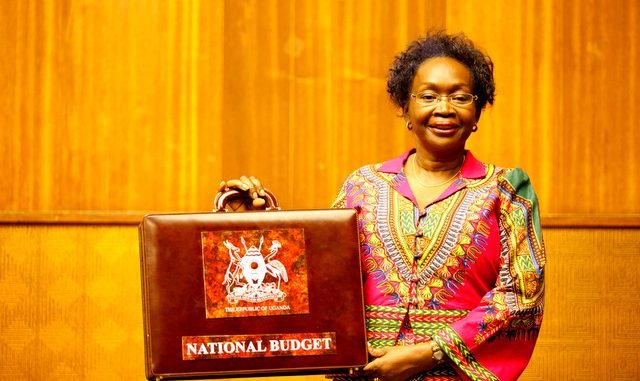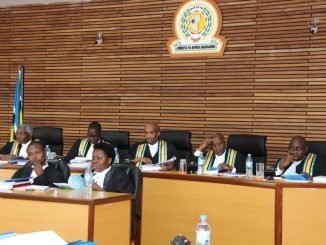
Kampala, Uganda | By Timothy Kalyegira | The annual government budget proposals were presented to parliament and the nation on June 12, 2014 by the Minister of Finance, Maria Kiwanuka.
Like the 2013/2014 national budget, the proposed 2014/2015 budget tightens further the tax levy on some of the most basic household consumer items and services such as sugar, kerosene and withdraws on mobile money transactions.
Many in civil society, the media and the political opposition described it as an “anti-people” budget because of these increasing taxes on the common man.
In 2013, taxes on basic goods and services were raised after western donor nations cut back on aid following a major corruption scandal in the Office of the Prime Minister involving the embezzlement of money intended for the reconstruction of northern Uganda.
In 2014, western protests at the passing into law of the anti-homosexuality bill led to a further cut back in aid and budget support. Uganda in 2013 therefore found itself funding 81 percent of its budget, not because of increased economic activity but because of reduced donor support.
New taxes were also introduced on dairy products, agricultural machinery, cereals, fertilizers, crop seeds and pesticides, as well as educational products and materials.
Bank charges rose as did taxes on goods and services.
There was a proposed increase in expenditure on every major sector except the public sector management.
It is not clear what the increase in taxes is intended to achieve if government expenditure also increases, in effect wiping out any chance of a next increase in savings in the Treasury and a reduction in Uganda’s budget deficit.
Uganda’s national budgeting shows a country that does not seem to understand what it is doing or what it wants.
For example, the budgets in recent years have not drawn attention to the urgent need for planned, quality and affordable housing in an increasingly congested Kampala city.
In the last two budgets, 2013 and 2014, the lands, housing and urban development sectors received only 30 billion and 99 billion shillings respectively.
However, in 2013/2014 and 2014/2015, the largest portion of the budget was allocated to works and transport, in this case that meant roads.
The argument by the government is that infrastructure is the main ingredient in stimulating economic growth, but housing is a more urgent need than roads.
The 2014/2015 budget shows sudden urgency by the government in tackling long-standing problems and complaints in the country. This budget, therefore, has to be understood in terms of the political climate in the country.
In particular, it should be understood in terms of the 2016 general election which seems to be overshadowing every political discussion in the country these days.
Last year after the Coordinator of the intelligence services, Gen. David Sejusa, defected from the army, there were stepped up efforts by President Yoweri Museveni to meet and address the needs of the NRA guerrilla veterans in Luwero.
What makes the 2016 election difference from all the other elections since 1996 is that for the first time, Museveni faces the real prospect of a breakup of the NRM.
As most interested Ugandans now know, 2014 has been dominated by news of the appearance of two rival factions within the NRM, one loyal to Museveni and the other loyal to the Prime Minister Amama Mbabazi.
The tensions have arisen over reports and suggestions that Mbabazi intends to seek the presidency of the NRM at the 2015 party delegates’ conference and running as the NRM presidential candidate, seek the Ugandan presidency itself.
He is known to be wealthy and more important, have a large political network of supporters across the country, just as Museveni has and is an experienced political operative.
In some quarters of the West, more and more questions are being asked about how long Museveni should continue in power with the 30-year anniversary of the NRM only two years away.
With the West starting to ask about the continued stay in power by Museveni and the lack of a clear successor in sight, some in the Museveni camp believe that the West is behind the gathering effort to have Mbabazi run for the national presidency in 2016.
Unlike the 1996, 2001, 2006 and 2011 general elections, the 2016 elections if Mbabazi’s presidential ambitions are real, he would see a struggle from within the ruling NRM.
It would be a real contest and not the walkover that political analysts have sometimes characterized previous elections.
As more of these questions are raised by the West, which remains an influence in the affairs of Uganda, the NRM government or at least President Museveni seek new ways to reduce as much as possible Uganda’s dependency on western donors.
There are also moves to speed up as fast as possible the start of Uganda’s oil production. With oil revenues, the NRM state can be shielded from the effects of further aid cuts from the West.
However, oil production is a capital intensive and infrastructure dependent business. Uganda’s infrastructure as it is is inadequate to handle the demands of oil drilling.
That is partly why the largest recipient of this year’s budget was the road works and transport sector.
In other words, Museveni must now deliver and be seen to deliver on services and an improving economy. This is why he announced during his State of the Nation address that he would put the National Agricultural Advisory Services (NAADS) in the hands of the army.
The president cannot afford any more failures on the grounds of incompetence.
Any more appearance of incompetence or failure to either deliver basic services or show signs of starting the road to Uganda’s transformation not only can be used in 2015 against him by the rival NRM camp, but by the western donors.
The overwhelming victory by Brenda Nabukenya of the opposition Democratic Party in the Women’s by-election in Luwero, the birthplace and heart of the NRM/NRA, was a wakeup call that the NRM can no longer take support for granted.
In radio talk show discussions of Nabukenya’s win that weekend, NRM cadres and officials did not sound surprised that an opposition candidate had won. They appear to have known in advance that Luwero’s loyalty was now with the opposition.
This indicates that President Museveni has accurate intelligence on the situation as it is in the country and his political standing.
But the question is: if the NRM is now aware of its falling popularity even in areas that were once its stronghold and most of these areas are heavily dependent on agriculture, why would the agriculture budget remain relatively low and money for roads and other public works continues increasing?
Why not, if anything, divert money from roads and to agriculture in order to appease farmers who are an important part of the economy and the voting bloc?
A few cynical analysts look at the budget in a different way. The reason for the Ministry of Works receiving the largest part of the 2014/2015 budget is that roads are an important but abstract national resource in the minds of most ordinary Ugandans.
The majority still goes about on foot to church, mosque, school and market. In real terms, it does not make a difference whether a particular highway is tarmac or murram.
And so, from this point of view, the purpose of putting so much money into roads and neglecting agriculture where 80 percent of Ugandans earn their livelihood is that it is easier to divert this same money without serious consequences.
To put it another way, believe the skeptics, much of the money budgeted for roads is intended to be secretly diverted later for political campaigns ahead of the 2016 elections.
It is not unusual for governments, not just the NRM, to disguise classified budgets under various ministries.
With South Sudan and the Central African Republic now in civil war, Somalia still unstable and Kenya increasingly faced with terrorism, it would have been expected that the government increases the defence and security budget and Ugandans would find it difficult to question that.
Instead it is the Ministry of Works that receives more money than any other sector. That would confirm the view of the doubters who believe that in the end, we are not going to see all major roads in Uganda getting tarmac.
What we are more likely to see in the next few months is more and more sacks of money handed out to NRM party youths and other political aides.



